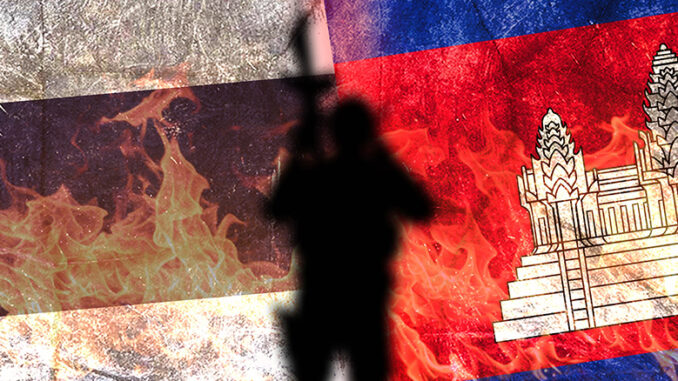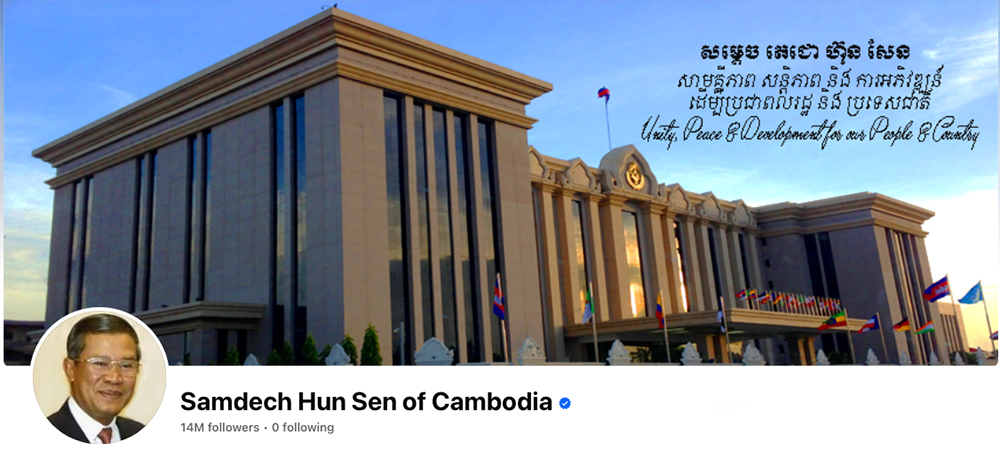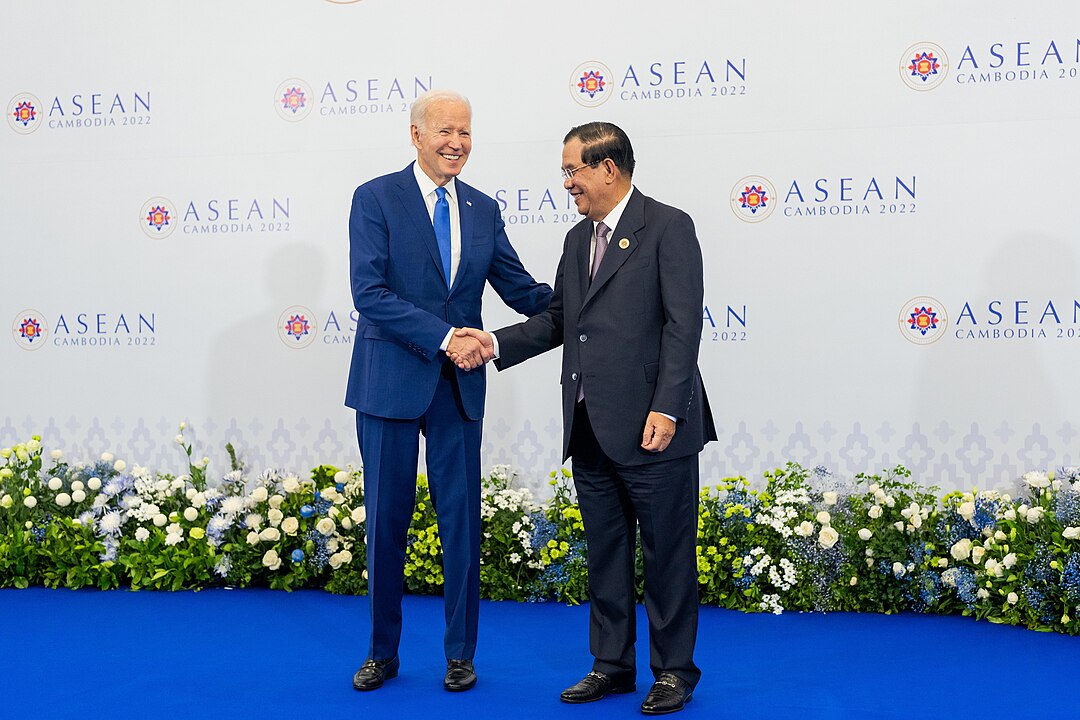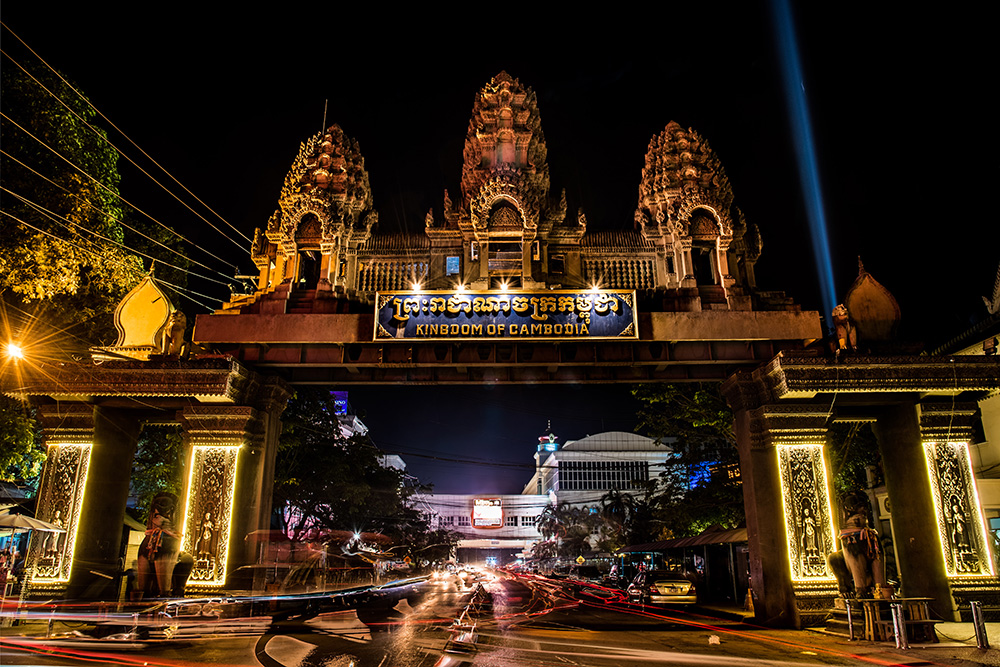
On May 28, 2025, Cambodian and Thai armed forces clashed briefly along the disputed frontier region of Thailand’s Ubon Ratchathani and Cambodia’s Oddar Meancheay Provinces in Chong Bok. The clash resulted in one Cambodian soldier’s death and has resulted in continuous escalations by both sides, including border crossing closures, cutting off electricity and internet, and vegetable trade, and increases in military deployments to the border region. Amid escalations, both sides met in Phnom Penh on June 14 within the Joint Boundary Commission framework to begin talks that had been stalled for 13 years. While nothing of deep substance was achieved, there was a feeling that perhaps relations were improving after the meeting. Everyone was dead wrong.
BREAKING: Thai Airforce Commander Air Chief Marshal Punpakdee Pattanakul said on Friday morning that the Airforce is ready to dispatch its jets within 5 minutes to defend the Thai border if necessary. #Thailand #Cambodia pic.twitter.com/AdVxhpAVOj — Khaosod English (@KhaosodEnglish) June 27, 2025
Hun Sen Ignites Dynamite Under the Thai Government
On June 18, 4 days after the JBC meeting, a small nuclear explosion rocked Bangkok and echoed across Southeast Asia. Hun Sen; Cambodia’s former prime minister, current Senate president, minister mentor, and Southeast Asia’s longest-serving autocrat, released a secretly recorded audiotape of a 17-minute private conversation he had with Thailand’s PM Paethongtarn Shinawatra.
The tape has ignited a firestorm in Bangkok, with Thaksin’s enemies, of which there are plenty, calling for the PM to immediately resign and threatening street protests. The second largest party in the coalition government, the Bhumjaitai Party, quit the coalition, taking its 69 MPs and leaving the embattled prime minister with a slim parliamentary majority of less than 10 seats.
When one listens to the tape in full and takes the long-standing and seemingly close relationship between the Hun’s and Shinawatra’s into context, there is a lack of damning content to slam the PM. Perhaps her tone was too soft and unbecoming of a prime minister, but there is no ‘smoking gun’ to accuse the PM of selling out the kingdom.
However, the clip leaves more questions than answers. Why would Hun Sen burn and destroy Thaksin? It is well known that after Thaksin was overthrown in a military coup in 2006, Hun Sen gave him refuge and even appointed him as a special economic advisor. He even made a special trip to visit Thaksin after his return from exile. Why is Hun Sen all of a sudden so fiery concerning border issues? It is well known that during the Prayut government, both PMs agreed to not discuss Preah Vihear and the border dispute and instead focus on trade. Why would Hun Sen destroy Thaksin’s daughter in public when Thailand has been pushing for very close relations with Cambodia since taking over the government?
Cambodian Senate President Hun Sen has publicly accused Thai Prime Minister Paetongtarn Shinawatra of committing an act of national treason.#HunSen #Paetongtarn #treason #2ndArmyRegion #bordertensions #ThailandNews #TheNationhttps://t.co/MegFhQoNRF — Thenationthailand (@Thenationth) June 27, 2025
Lying in International Relations: The Question
John Mearsheimer’s excellent book on leaders and lying, Why Leaders Lie: The Truth About Lying in International Politics, argues a few salient points. Leaders lie. No great surprise, as they are human and politicians. Mearsheimer also finds that leaders do lie, but they lie to their own populations. Leaders, when they interact with one another, do not lie. The reason is twofold and obvious: Trust in international affairs is finite; once trust is broken, it cannot, or is extremely difficult to, recover. Second, international politics and relations are a constant. States do not cease to exist, and the need or impulse to carry on relations is also a constant. To lie to another leader and demonstrate to the international community that you are untrustworthy can damage relations on a broad and long-term basis. The same is not true in domestic politics, where narratives can be controlled and the public tends to have short memories.
The above spotlights why the continuing drama between the two political dynasties is both uncommon and fascinating. Hun Sen undoubtedly set fire to his long-standing relationship with Thaksin Shinawatra and permanently burnt the bridge connecting their two families’ political dynasties. The question is why? There is no definitive answer known to the public. Only the principals and their closest associates know. However, there can be informed speculation based on analysis of the current political landscape. Nonetheless, the betrayal is deep, dishonorable, unbecoming of senior stateman and goes against all rational behavior of leaders.
Much of state behavior in international affairs and politics traces back to domestic politics. This is the lead in and central argument of this analysis.

Lying in International Relations: Possible Answers, The Donald Effect
Hun Sen is prolific on social media, namely Facebook and, to a lesser extent, X, formerly Twitter. He posts often and, of late, regularly. Similar to President Trump, who is a prolific poster on Truth Social. Both are leaders of their respective countries. Hun Sen, even though he has stepped back, is recognized as the power behind the throne in Cambodian politics, with his shadow looming large. Donald Trump is ‘leader of the free world’ and has been at the center of American politics for a decade.
Hun Sen, now, and Donald Trump, always have very loose lips. Most leaders do not reveal any aspects of their communication with other leaders. They provide boilerplate, template, and scripted answers to the public. They refer to their spokespersons and Ministry of Foreign Affairs for substantial commentary. Hun Sen is now spilling the beans on privileged, private, and consequential communications with Thailand’s leader. Donald Trump regularly has conversations with world leaders and takes to Truth Social to inform the public of aspects, of course not all, of their conversations. Some would argue that Donald Trump makes much of it up, as is the case with President Xi and tariffs, but let’s set that aside.
Compare this behavior to President Putin, Xi, or PM Modi. They never, ever, let on about private conversations with world leaders, as these are privileged and private. This leads towards something deep and substantive brewing in Cambodian politics.
Possible Answers to the Burning Down Thaksin Shinawatra: Emotion and Preah Vihear

The fact that after the initial backstab on the 18th, Hun Sen at the point of great weakness for the Thai PM, after Bhumjaitai left the coalition government and calls to resign build, felt the need to pour more gasoline on the fire, points to betrayal or emotion.
Two possible reasons may be some unknown deep feeling of betrayal on a personal level by the two old political hands. Or, a deep cultural and psychological attachment to the old temples which are at the heart of the border disputes. Why now, all of a sudden make an issue doesn’t fit. It is known that Cambodia wants the ICJ to take up the border issue again
On June 16, two days after the JBC meeting, Cambodia sent a ‘letter of intention’ to the ICJ concerning Preah Vihear and the broader border issue. It is known that Cambodia is attempting to link Preah Vihear to the other temples and disputed border areas. This is because Thailand is bound to the ICJ via the original 1959 Temple Case. Since 1960, Thailand has rejected ICJ compulsory jurisdiction. Taking Thailand to the ICJ is a non-starter for any new case, as the ICJ cannot compel a UN member against its wishes.
However, if Cambodia can get the international community involved due to military skirmishes or broader military conflict, the opportunity for the UNSC or ICJ to issue preliminary measures, hence broadening the border dispute to include more than just Preah Vihear, becomes possible. Perhaps, the massive backstab is an attempt to get emotions high enough that Thailand overreacts militarily with a provocation that will bring international eyes, the UNSC and the ICJ to take up the issue.
The temple issues are a deep and emotional wound in Cambodia. This was seen in Cambodia’s official protest surrounding Siha Nakhon Temple at Wat Phu Man Fah, Buriram province. The temple, a replica of Angkor Wat, sparked allegations of cultural appropriation from Phnom Penh. These sorts of cultural disputes have been more pronounced of late with disputes over Muay Thai/Kun Khmer, traditional dress, food, and other cultural landmarks of both countries.
This points analysis towards, rallying Cambodian society around the flag with nationalism and to the governing party which is still in the generational handover and may very well soon feel intense economic dislocation when the Trump administrations’ 90 tariff pause runs out in early July. Regime stability may very well be at the heart of the calculus made by Hun Sen to ditch his ‘friend’ of 30 years. Any other PM or government will not be as friendly as a Thaksin government so the cost-benefit must be high.

Possible Answers to the Burning Down Thaksin Shinawatra: An Economic View
The Trump administration introduced new tariffs on ‘liberation day,’ placing Cambodia at the highest rate with a 49% tariff. Among the first to react was Cambodia, which quickly offered concessions, though these efforts may not be sufficient to shield the economically vulnerable nation. Exports make up 40% of Cambodia’s GDP, with the U.S. accounting for 27% of total exports. Even a lower tariff of 10% could significantly impact Cambodia’s economy and workforce, potentially leading to labor and political instability.
We cannot know the tenor or progress in the trade talks between Cambodia and America. However, two recent reports paint a gloomy picture. America’s 2024 Trafficking in Persons Report ranked Cambodia as a Tier 3 country. The report further noted official complicity in the illicit traffic. The UN Office on Drugs and Crime recently released a report on illicit business in Southeast Asia. The report was unambiguous, identifying Cambodia as the center of multi-billion-dollar international scamming networks and highlighting similar trends to the TIP report on official corruption. In connection to Cambodia’s massive international scammer networks, in May the US Treasury is planning to ban Cambodian financial firm Huione for its alleged involvement in a wide-ranging money laundering operation. Huione is alleged to have launder at least $4 Billion in illicit funds from scammers, possibly including North Korea, a long time American target. Trump unlike Biden is not influenced by human rights issues so this may be a moot point.
Cambodia is not a powerhouse, nor is it that important to American trade. If the previous reports impact trade perceptions in Washington, Cambodia could be in for a very serious smackdown come early July. One example is the garment industry, which manufactures global brand-name merchandise for GAP, Nike, and many other multinationals. The garment industry accounts for some 60% of Cambodian exports, bringing in billions in revenue and employing between 500,000 to 750,000 Cambodian workers. America and the EU together account for some 70% of these garment exports. Garments are simple, low-cost, high-labor-intensive, low-capital-intensive industry that are mobile. Meaning, if massive tariffs are put on Cambodia, international manufacturers can simply uproot their manufacturing to another non-landlocked LDC (least developed country) to enjoy tariff-free access to wealthy markets, for instance, Bangladesh. Cambodian labor in these industries is low skill and definitely not irreplaceable in the garment supply chain, however, Cambodia and its economy could be massively impacted.
There are strong signals that economic troubles are on the horizon given intervening factors that may impact any trade negotiations. This line of thought will be revealed on July 8, when Trump’s pause ends. If tension continues to rise to the 8th and then shift afterwards due to lack of application of the original tariffs, another pause is announced, or the tariff rate is low and tensions abate, then the economic line will be proven true. It is entirely likely that on the 8th Trump will announce something along the lines of ‘Many nations, over 50, are lined up with great offers, but they are tough negotiators, very tough—I’ve decided to give them all another 90 days while we negotiate these great trade deals that will Make America Great Again.’

Possible Answers to the Burning Down Thaksin Shinawatra: The Generational Change in Cambodian Politics & Casino’s
In the shifting landscape of Cambodian politics, PM Hun Manet, who is relatively young and newly elected, faces challenges as he lacks the political influence of his father. Additionally, General Tea Seiha has taken over the Ministry of Defense from his father, Tea Banh. Tea Seiha appears to lack the strong leadership his father was known for, and there are signs of divisions within the military ranks. Hun Sen has his own elite military unit, the BHQ bodyguard division, which is heavily armed and well trained. This unit was recently dispatched to the disputed border area, which begs the question of why not use the regular army already in the region.
In the released clip, Hun Sen is heard remarking multiple times, when asked by PM Paethongtarn what he wants, to open the border. The border crossings in reference are in Thailand’s Srakaew, Chantaburi, and Trat provinces. The most well-known are the casino entrepôts of Poipet and Koh Kong, which are home to large casino complexes that rely primarily on Thai gamblers. It is well known that shady figures from Thailand, Cambodia, and Hong Kong own and operate these multimillion- or billion-dollar enterprises. It is further known that prominent Thai and Cambodian politicians are directly involved in operating the casinos. Figures such as Samphor, Pailin’s governor, and former Puea Thai heavyweight politician Watthana Asavahem, who fled the kingdom over corruption charges. It is rumored that this is a major source of funding that flows directly to the top of the Cambodian political structure.
The casino issue is a strong data point due to the estimated monetary figures involved, which range from 5 billion baht upwards to over 10 billion baht annually. Thaksin and his Puea Thai party have been pushing for legislation to legalize ‘entertainment complexes,’ otherwise known as casinos. This is a post-election plank unveiled to help diversify the Thai tourism industry. It is known that the majority, 50% or more, of gamblers at Cambodia’s casinos are Thai. Thailand legalizing casinos would represent a major threat, possibly existential, to the Cambodian industry and a major source of revenue for the Cambodian ruling elite. Why would people travel hundreds of kilometers to the Thai-Cambodian border to gamble when Thailand’s major cities have all amenities without the hardscrabble of rural Cambodia? Likely they wouldn’t, which would spell the death of the Cambodian gambling industry.
On June 20, Hun Sen released more photos of himself hosting the Thai PM on her trip to Cambodia in April 2025. During the trip, she paid a visit to Hun Sen at his home, and new pictures were posted showing both in the rooms where Thaksin and his sister Yingluck slept when they fled Thailand after coups to safety in Hun Sen’s Cambodia and personal residence. The rooms were named ‘Thaksin’ and ‘Yingluck,’ respectively, according to Hun Sen’s post. He further provided a statement that can’t be taken seriously but points towards something deeper.
To signpost the personal nature of the dispute Hun Sen took to social media again on June 26. This time raising the stakes prior by traveling to Oddar Meancheay province in military fatigues and speaking to a crowd. His words set Thailand’s media and society on fire with the entire Kingdom waiting for what would be released next, similar to people years earlier waiting for the next episode of Thailand’s Got Talent. Hun Sen stated;
“I never imagined that a family I helped would rise to become prime minister and cause such issues. One moment they claim to have power, the next they say they don’t. Tomorrow, I will talk about this”
“If you act arrogantly, I will expose everything you told me, including your insults to your king. Discipline your children. You have a child as prime minister, and I have a child as prime minister. But don’t mistake me for someone you can cross. I owe Thailand nothing”
“Right now, we don’t know who to negotiate with or who holds real power. Is it the military, a political party, someone behind the party or the prime minister? We don’t know who has true authority. We understand that only when a new prime minister takes office might there be willingness to resolve these issues”
Hun Sen’s great reveal on the 27th was largely a nothing burger. He only stated that when he visited, Thaksin was faking his ‘injuries’ to get out of police hospital early after receiving a royal pardon. Next month, Thaksin is going to court over allegations he faked his conditions to escape jail time, which no one in the kingdom believes. Nonetheless, given the fast drip of social media posts, more is likely to come if Paethongtarn and Thaksin continue to hold onto power.
Hun Sen has fatally wounded Thaksin and will likely bring down the government, the only question is how fast will Thailand be rid of its 3rd Shinawatra Prime Minister. Social media and his close relations with Thaksin were the tools used in quite brilliant manner to destroy a Thai political dynasty.
Protesters gather at Victory Monument; Traffic unaffected so far
.
Protesters, including local residents and business owners, began assembling at the Victory Monument in Bangkok, with crowds from various provinces joining the rally organized by the “Uniting the Power of the Land… pic.twitter.com/s5UR8eVKXa— Thenationthailand (@Thenationth) June 28, 2025
Conclusions
The title of this is not equate Hun Sen with Donald Trump, they are vastly different people. However, the clever use of social media and dishonorable deception connects them. Hun Sen has been able to use Facebook and X to control the narrative between the two countries. Trump controls the media and is always in control of the narrative. Both statesmen have now engaged in political deceit at the highest levels. Trump by colluding with Isreal to engage in fake nuclear negotiations only to have Isreal launch military attacks on Iran. Hun Sen has betrayed his ‘old friend’ and broken the diplomatic ‘code of honor’ to never reveal personal statements, especially to secretly record and publish a private conversation meant to harm another country. Hun Sen in a masterstroke of political deception and deceit carried out an extremely dishonorable set of acts which breaks all decorum and has destabilized Thailand, his adversary in the border dispute.
Unlike Hun Sen, Thaksin’s political dynasty ends with him. Thaksin’s children are not involved and do not care about politics. Hun Sen may very well view this Thaksin-backed government as weak (which it is), ineffectual (which it has been), and likely to fare poorly in the future. Put simply, in the near future, Thaksin is no longer a viable partner who can barely control events in Thailand. Combine this with the other factors, and it may have tipped the scales to ditch Thaksin and firewall his children and the regime in Phnom Penh during the transition.
The reason/s for Hun Sen’s intervention will be revealed in the near future. Hun Sen is an old man and he is looking to cement his legacy as Cambodia’s enduring strongman by reclaiming temples and staring down his patronizing and larger neighbor. While the former is unknown, he has succeeded on the second.
Regardless of his reasons, critical weaknesses of the Thai political system have been laid bare. Thailand’s bankrupt traditional elite undermining of the political system, acting as if Thaksin is not the PM on multiple occasions, placing a novice 30-year-old in the PM seat, personal corruption and political dynasties, and a moral bankruptcy of Thailand’s elite have led the kingdom to be a laughingstock and threatened Thai security to a degree not seen in generations. Thaksin’s ‘enemies’ in Thailand who have accommodated or supported his return and rehabilitation in silence are equally complicit and responsible for this latest farce.
William J. Jones
William J. Jones is an Assistant Professor of International Relations at Mahidol University International College, Thailand. His research focuses on Security and International Relations of Asia-Pacific, Geopolitics, Human Rights and Contemporary Thai Politics.
